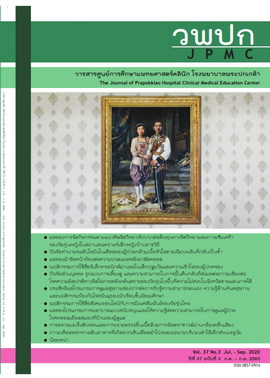Effects of Positive Psychology Activities on Psychological Capital and Depression among Female Adolescents in the Rajvithi Home for Girls
Main Article Content
Abstract
Background: Many studies have reported the negative outcomes of the placement of orphan adolescents. To promote these adolescent’s mental health, the researchers created and applied activities from positive psychology interventions (PPI) and the psychological capital (PsyCap)theory to increase the psychological capital of female adolescents residing in the Rajvithi Home for Girls, Bangkok, Thailand.
Objectives: To examine the effect of positive psychology activities on the psychological capital and depression among female adolescents.
Materials and Methods: This study was a quasi-experiment research proposing the effect of positive psychology activities on psychological capital and depression. Volunteered adolescents were randomly assigned by using simple random sampling. The experimental group received treatment for eight consecutive weeks (one hour/week). The subjects’ psychological capital and depression were assessed by using the Thai Psychological Capital inventory and Centre for Epidemiologic Studies-Depression scale in a pretest, post-test, and follow-up after a month. The data were analyzed using non-parametric statistics.
Results: From the pretreatment to post-treatment of the positive psychology activities, the experimental group’s scores was significantly superior to the control condition in regard to hope and optimism (p< 0.05). However, the scores of self-efficacy, resilience, and depression in the pretest, post-test, and follow-up periods of the experimental group were not significantly different, but the depression scores tended to decrease overtime.
Conclusion: These findings suggested using positive psychology activities were a useful way to develop hope and optimism in female adolescents. Together, these activities may be useful as supplementary exercises to increase hope, optimism, and reduce depression in adolescent population.
Article Details
References
Thielman N, Ostermann J, Whetten K, Whetten R, O’Donnell K, Correlates of poor health among orphans and abandoned children in less wealthy countries: the importance of caregiver health. PLoSOne [Internet]. 2012 [cited 2020 Jan 29]; 7(6):e38109. Available from: https://journals.plos.org/plosone/article/file?id=10.1371/journal.pone.0038109&type=printable
Kreppner J, Kumsta R, Rutter M, Beckett C, Castle J, Stevens S, et al. IV. Developmental course of deprivation specific psychological pattern: early manifestations, persistence to age 15, and clinical features. Monogr Soc Res. Child Dev 2010;75:79-101.
Horwitz AG, Hill RM, King CA. Specific coping behaviors in relation to adolescent depression and suicidal ideation. J Adolesc 2011;34:1077-85.
UNICEF Thailand. A situation analysis of adolescents in Thailand 2015 – 2016. Bangkok: UNICEF Thailand; 2016.
Bennetta DS, Ambrosini PJ, Kudesb D, Metzc C, Rabinovich H. Gender differences in adolescent depression: do symptoms differ for boys and girls?. J Affect Disord 2005;89(1-3):35-44.
Kongpet S, Suntibenchakul S. Prevalence of depression and conduct behaviors for adolescents (10-15 years old), at Rajvithi Home for Girls. Chula Med J 2015;59:103–14
Seligman MEP, Rashid T, Parks AC. Positive psychotherapy. Am. Psychol 2006;61:774-88.
Sin NL, Lyubomirsky S. Enhancing well-being and alleviating depressive symptoms with positive psychology interventions: a practice-friendly meta-analysis. J Clin Psychol 2009;65:467-87.
Bolier L, Haverman M, Westerhof GJ, Riper H, Smit F, Bohlmeijer E. Positive psychology interventions: a meta-analysis of randomized controlled studies. BMC public health [Internet]. 2013 [cited 2020 Jan 29];13:119. Available form: https://bmcpublichealth.biomedcentral.com/track/pdf/10.1186/1471-2458-13-119
Chang EC, Sanna LJ. Optimism, pessimism, and positive and negative affectivity in middle-aged adults: a test of a cognitive-affective model of psychological adjustment. Psychol Aging 2001;16:524-31.
Hart SL, Vella L, Mohr DC. Relationships among depressive symptoms, benefit-finding, optimism, and positive affect in multiple sclerosis patients after psychotherapy for depression. Health Psychol 2008;27:230-8.
Youssef CM, Luthans F. Positive organizational behavior in the workplace: the impact of hope, optimism, and resilience. J Manag 2007;33:774-800
Alarcon GM, Bowling NA, Khazon S. Great expectations: a meta-analytic examination of optimism and hope. Pers Individ Dif 2013;54:821-7.
Trotzer JP. The counselor and the group, Integrating theory, training, and practice, 4th ed. New York: Taylor & Francis Group; 2006.
Tuntatead H, Phattharayuttawat S, Manusirivithaya V. The development of Thai psychological capital inventory. J Psychiatr Assoc Thailand 2014;59:73-83.
Trangkasombat U, Larpboonsarp V,Havanond P. CES-D in adolescents J Psychiatr Assoc Thailand 1997;42:2-13.
Peterson C, Steen TA. Optimistic explanatory style. In: Snyder CR, Lopez SJ. editors. Handbook of positive psychology. New York: Oxford University Press; 2002. p. 244-56.
Layous K, Chancellor J, Lyubomirsky S, Wang L, Doraiswamy PM. Delivering happiness: translating positive psychology intervention research for treating major and minor depressive disorders. J Altern Complement 2011;17:675-83.
Meevissen YM, Peters ML, Alberts HJ. Become more optimistic by imagining a best possible self: effects of a two week intervention. J Behav Ther Exp Psychiatry 2011;42:371-8.
Fleming AW. Positive psychology "three good things in life" and measuring happiness, positive and negative affectivity, optimism/hope, and well-being. [dissertation]. New York: State University of New York College at Brockport; 2006.
Seligman ME, Steen TA, Park N, Peterson C. Positive psychology progress: empirical validation of interventions. Am Psychol 2005;60:410-21.
Bandura A. Self-efficacy: the exercise of control. New York: W.H. Freeman and Company; 1997.
Yomaboot P. Effects of music therapy on the level of self-esteem and depression on female adolescents in Rajvithi Home [dissertation]. Bangkok :Mahidol University; 2009.

